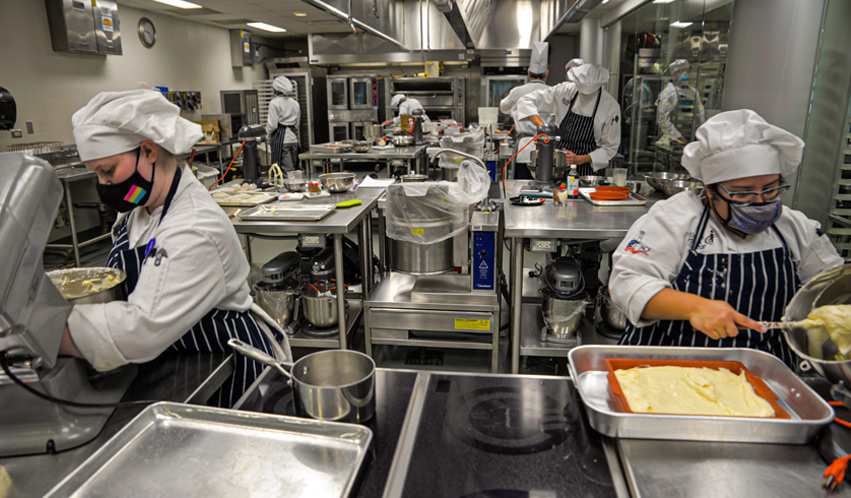
Since the beginning of the COVID-19 pandemic, nearly every industry has been affected, but the restaurant and culinary industry has undoubtedly taken one of the hardest hits. In fact, it ended the year 2020 at $240 billion below its pre-pandemic forecast, according to the National Restaurant Association.
The good news? So far, 2021 is proving to be a rebuilding year. During the first seven months, restaurants added 1.3 million jobs, bringing the industry within one million of its pre-pandemic employment level of 12.3 million jobs. Trends like carryout and delivery continue to be popular and proved vital in the survival of many industry businesses.
Throughout this time, the Illinois Central College Culinary Arts and Restaurant Management programs have adapted and continued to provide a high-quality culinary arts and hospitality education. In fact, ICC was re-accredited by the prestigious American Culinary Federation Education Foundation’s Accrediting Commission (ACFEFAC) in 2020—one of only two Illinois culinary schools with the rare “Exemplary” status, and the only one outside of Chicago. Graduates of the program are becoming tomorrow’s food service directors, banquet or executive chefs, head or line cooks, executive sous chefs, food prep workers and bakers, to name a few.
Adapting To Covid
When it was forced to transition to online learning in March 2020, ICC’s culinary programs kept students engaged through the creation of “food kit packages.” These take-home kits contained the ingredients and recipes needed to prepare dishes, allowing them to continue critical, hands-on instruction from the safety of their homes while faculty taught virtually.
In Fall 2020 and Spring 2021, culinary students followed a hybrid format of both online lectures and face-to-face, on-campus labs. The on-campus instruction allowed students to return to the state-of-the-art kitchen facility for hands-on learning. With half of the student population preferring all-online courses, the Fall 2021 semester offered culinary students the option of the hybrid format, in addition to online classes.
“Just like the culinary scene, we have adjusted and remained flexible throughout the pandemic with our classes and curriculum. Even with all the COVID-19 adaptations, our program offers a world-class culinary education at a community college price point,” says ICC professor and program chair Chef Charles Robertson. “I am 100-percent confident our graduates can go anywhere in the world and find a job. Our high placement rates and the success of our alumni confirms it.”
A Big Impact
ICC adjunct faculty and culinary alumna Chef Golda Ewalt agrees the ICC program makes a big impact in central Illinois. “The Institute brings people life-changing skills and opportunities. It educates and inspires people of all ages to grow their culinary skills. Graduates from the program are filling the staffing needs of restaurants, bakeries, hospitals and catering businesses in our region. It also provides the basis for culinary entrepreneurs to create their own businesses.”
The impact of the ICC Culinary program has to do with its rich history. In addition to its rare “Exemplary” accreditation status, the program has received numerous honors and distinctions. It was awarded the prestigious “Best in the Midwest – Education/Institution/Business/Industry” designation by the Heart of Illinois Hospitality Association (HOIHA); all six nominees for the 2019 Heart of Illinois (HOI) Chefs Chapter “Student Chef of the Year” were ICC Culinary Arts students or recent graduates; and Chef Robertson and Chef Keith Shank were nominated for HOI Chefs Chapter “Chef of the Year,” along with Chef Golda and fellow ICC alumna Chef Amy Carey. Alumnus Chef Josh Adams has also been recognized nationally as a James Beard Award nominee and semi-finalist.
“My culinary education at ICC was invaluable,” Chef Golda explains. “I learned how important it is to be open to feedback. You put your heart into your cooking, but it can always be improved. You have to practice your craft to improve, continually experiment and grow. Communication and teamwork are vital characteristics of a chef. These aspects not only help me as an adjunct professor, but also in my position as director of food and nutrition services at OSF.”
When asked about her ICC experiences, Chef Golda recalls one of the most important lessons she learned was the French culinary term “mise en place,” which represents being prepared and having everything in its place to create a successful event. She also recounted her professors encouraging her to volunteer for the Heart of Illinois Professional Chef Association, and she has been an active member ever since. With a chuckle, she reminisces about the time she accidentally added salt instead of sugar to blueberry scones. “My lab partner and I didn’t taste them before having our professor try them. Needless to say… we didn’t get a great score on that particular lab!”
Growing Opportunities
As the restaurant and culinary industry continues to recover in 2021, the Greater Peoria area has an abundance of work opportunities. A certificate or degree from the ICC Culinary program can propel individuals into these open positions, ensuring a family-sustaining wage for their family while also filling local workforce gaps. Current Emsi data shows the median salary for chefs and head cooks in central Illinois is $48,879 with 28 annual job openings; food service managers are currently at a median salary of $41,638 with 88 annual job openings. And those numbers continue to grow. For more information regarding the ICC Culinary programs, visit icc.edu/culinaryarts. PM
- Log in to post comments

